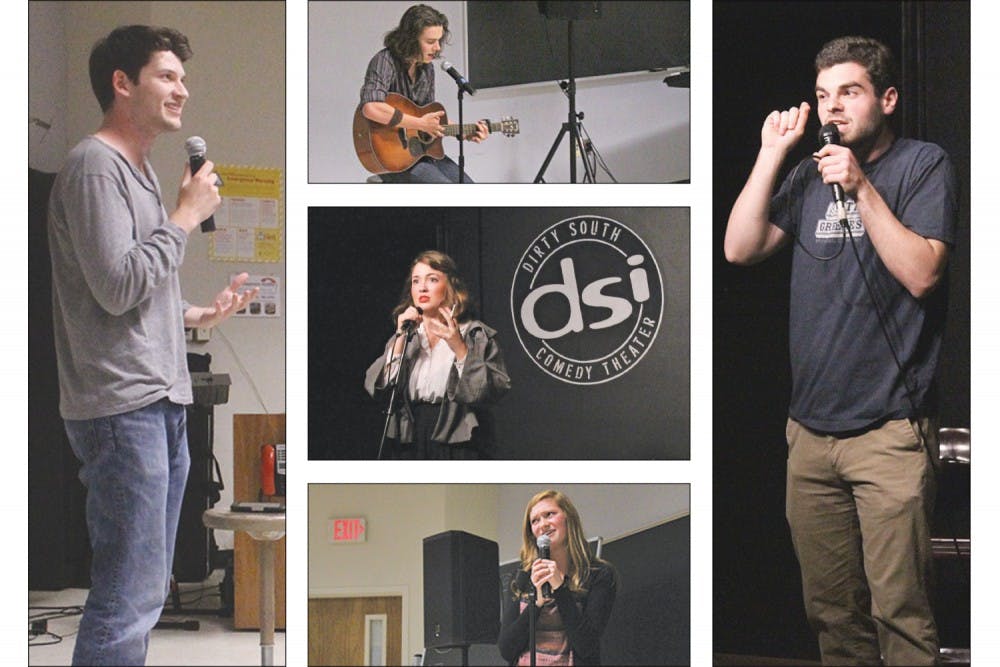“I don’t think there’s an organized outlet on campus yet, where funny people are getting together to look at the campus with a critical eye and say ‘What can we poke fun at?’” he said.
Filling the role of improvisation and sketch since 1995 is Chapel Hill Players. CHiPs’ incubator team coach Luke Miller likes the collaboration.
“We, as an ensemble, are just interested in having fun with each other on stage,” Miller said. “That’s not just for a self-indulgent purpose. If we’re having fun on stage and we’re making each other laugh, we know that’s being transmitted to the audience, too.”
He said it’s important to work with, instead of against, other groups — like False Profits. He improved bonds with them as the president of CHiPs.
“We share equipment with them and just have a good working relationship,” Miller said. “We try to do our best to plan shows around each other so we aren’t cannibalizing each other’s audiences or anything like that.”
But the relationship wasn’t always so friendly. Senior Eric Clayton, former president of False Profits, remembers the stress.
“There was some tension as the group started because there was poor communication between the two groups and I guess the intentions weren’t made clear,” Clayton said.
This tension was eased by providing complimentary tickets to each others’ shows, to see each other’s comedy and gauge what each is doing.
The creation of False Profits, though, has opened the door for new comedy groups.
“I guess our role on campus is sort of providing healthy competition with the other comedy groups on campus and pushing the campus to do more comedy,” Clayton said.
And the push has worked. Rob Haisfield grew up watching comedy but never knew how to set foot into that world. After watching a False Profits show, he decided to audition.
Then, after making it to callbacks twice and realizing he liked the stand-up portion of auditions, he made a Facebook group to connect with students who wanted to try stand-up or go to open mics.
To get the day's news and headlines in your inbox each morning, sign up for our email newsletters.
The group has been meeting since Jan. 22 and is now in the process of becoming a club.
“The guys from the False Profits have been super helpful with me with getting that started up,” Haisfield said. “They sent me a copy of their constitution so I could use that to help write mine.”
With this club, he hopes to start a monthly open mic night and create relationships with other groups. He said he wants to get students involved in the Triangle comedy scene.
“These open mics are great, but I think that student audiences are a lot more friendly than a general open mic audience, partially just because they know you and they want you to be successful,” Haisfield said.
He also hopes to see professors sign up in the future, along with more students who have simply wanted to try stand-up comedy. Though the club doesn’t officially have a name, the show, for now, has been dubbed “Chapel Hilarity.”
“When you actually do well, then you just made a room full of people smile and you automatically made their day better as a result of that,” Haisfield said. “That’s a pretty cool thing to be able to say you did, just make an entire room full of people happier for the moment.”
Miranda Foster performed at Haisfield’s open mic Friday because she always wanted to know what it would be like for somebody other than her mother to think she’s funny.
“The audience was really receptive. It was much appreciated,” Foster said. “It’d be nice to try it in a real setting besides the biology department. While that was great, it’d feel more professional in a bar or restaurant or something like that.”
Micah Stubbs also did stand-up for the first time.
“I said YOLO and signed up and put what I thought were OK, decently funny jokes,” Stubbs said. “It’s a skill I definitely want to continue to develop and practice and hopefully get better at.”
The audience in Coker 201 was comprised of 75 to 100 people, giving Haisfield high hopes for the future of the open mic group.
“I think that when the next one comes around, people who went on Friday and had a good time will spread the word that the show was actually incredible,” he said. “Though, if it stayed around the current size, I wouldn’t be upset.”
@jmv0823
arts@dailytarheel.com




